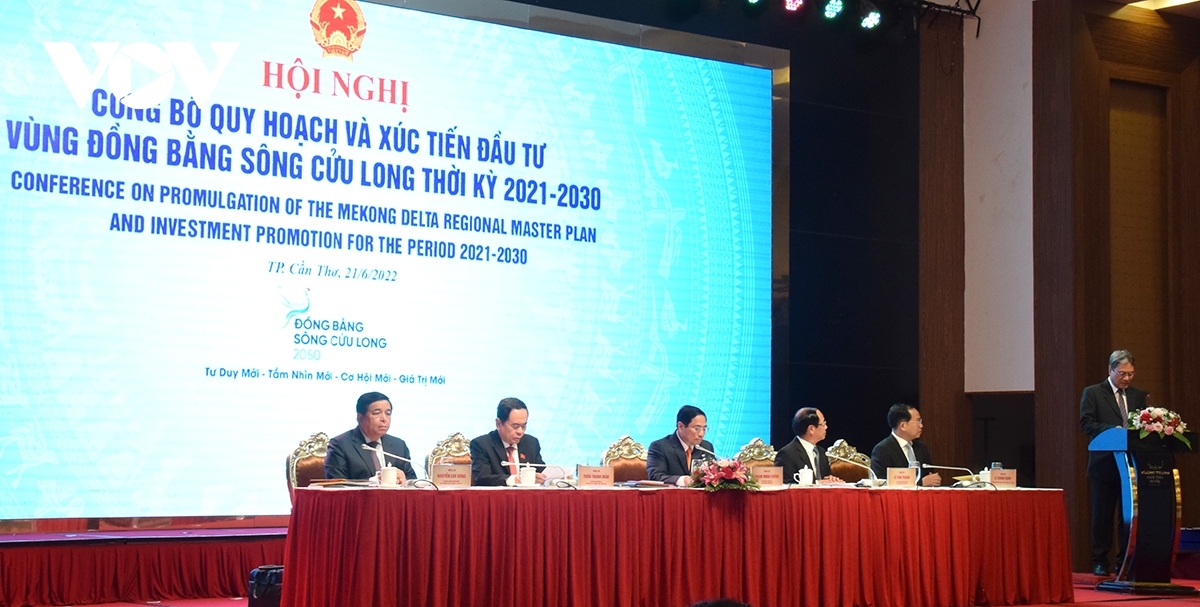Conference exams ways to promote investment in Mekong Delta
VOV.VN - Prime Minister Pham Minh Chinh chaired a conference on June 21 aimed at publicising the Mekong Delta regional master plan and investment promotion for the period 2021 to 2030 in Can Tho city.
Those in attendance at the event were representatives of central ministries, branches, localities in the Mekong Delta, and Ho Chi Minh City, alongside investors, businesses, development partners, experts, and scientists.
The Mekong Delta holds a key position in terms of politics, economics, social affairs, security, defence, and trade exchanges with ASEAN member states.
The sub-region is notable for being the largest granary and production centre of aquatic products and fruits throughout the country, contributing 31.37% of GDP to the entire agricultural sector with more than 50% of rice production, 65% of aquaculture production, 70% of fruit, 95% of exported rice, and 60% of exported aquatic products. It also plays an important role in ensuring national food security and exports.
However, developments in the Mekong Delta have so far failed to live up to its potential, whilst the infrastructure has not yet met the development requirements, high-quality human resources have not been properly invested, and the material and spiritual life of the people remains limited compared to some regions.
The Mekong Delta is currently facing an array of challenges caused by the impact of climate change, the improper exploitation and use of water upstream, inadequate infrastructure, a general lack of logistics infrastructure for agriculture, and unpredictable market volatility.
The conference primarily focused on the Mekong Delta Plan for the 2021 to 2030 period, with a vision towards 2050, an Action Program to implement the Politburo Resolution No 13 on socio-economic development direction, and ways to ensure national defence and security in the Mekong Delta region ahead in 2030, with a vision towards 2045. This is in addition to an implementation plan for the Mekong Delta region in the 2021 to 2030 period, with a vision towards 2050, resources to implement the Master Plan, and investment opportunities in the Mekong Delta.
The conference emphasised the need to strengthen development linkages between localities in the Mekong Delta with Ho Chi Minh City and the southeast region as a whole, particularly expanding trade activities with countries throughout the ASEAN region. It was noted that there should be a specific focus on countries in the Mekong Sub-region aimed at mobilising and effectively utilising resources for socio-economic development.
It is hoped that by 2050 the Mekong Delta will be striving to become a region with a strong level of development compared to the country as a whole, being a worth place for people to reside as well as an attractive destination for both tourists and investors.
During the course of the meeting, ministers, chairmen of People's Committee of provinces and cities, representatives from economic groups at home and abroad, and ambassadors and leaders of international organisations based in Vietnam gave presentations aimed at clarifying any issues. This was done in order to successfully carry out the Resolution on development of the Mekong Delta region moving forward.
Participants primarily focused their discussion on agriculture restructure, investment attraction in the processing industry, irrigation infrastructure development, trade promotion and expanding markets for farm produce, renewable energy development, culture and tourism, and regional connectivity.
They also underlined the role and position of Can Tho as the centre of the Mekong Delta in terms of regional development linkages, whilst putting forward proposal orientations to promote development links between the region with Ho Chi Minh City and the southern key economic region.
A range of measures aimed at promoting sustainable marine economic development associated with mangrove ecosystem and coastal protection, natural disaster prevention, control and climate change adaptation, and co-operation and support for the Mekong Delta’s development were also raised as points of discussion.
The conference also saw the announcement of commitments made to finance the implementation of a number of infrastructure development programmes and projects within the framework of the master plan.
In her speech at the event, Carolyn Turk, world bank country director for Vietnam congratulated the Government of Vietnam on reaching this important milestone of launching the highly anticipated Regional Master Plan for the Mekong Delta region.
This is a fruitful outcome of the new strategic and holistic approach to regional development. It demonstrates the whole-of-government approach and a strong commitment to promoting sustainable development and enhancing the climate resilience of the Mekong Delta.
As a long-term trusted partner, the World Bank is honored to have supported the Government of Vietnam in the important task to formulate the Mekong Delta Regional Master Plan, she went on to say.
"We have partnered, for example, with the Government of Australia in providing analytical underpinnings for the development of the master plan, policy development and strengthening regional coordination. We will continue to support you as the master plan comes into implementation. We are committed to bringing our global knowledge, convening power and financing to work in partnership with the whole-of-government, development partners, private sector, and other key stakeholders to achieve sustainable, climate resilient and inclusive growth for the Mekong Delta. Together we can take strategic decisions and implement bold and innovative actions to further unlock the region’s potential," she added.
The same day saw PM Chinh and leaders of ministries and agencies attend a photo exhibition, a cultural activity that welcomes the conference announcing the planning and investment promotion in the Mekong Delta in the 2021 to 2030 period. This was chaired by the Ministry of Culture, Sports and Tourism, and the Ministry of Planning and Investment.
The purpose of the exhibition is to introduce the nation’s achievements in socio- economic development, science and technology, national security, international integration, and culture of the Mekong Delta region. It also featured the beauty of the land and people in the Mekong Delta, thereby depicting the beauty in cultural life, the spirit of preserving and promoting the cultural values and national identity of people in the Mekong Delta region.



